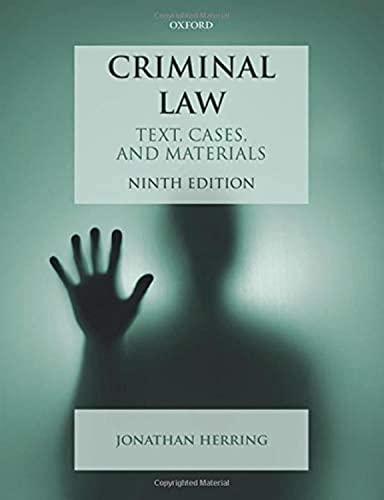Answered step by step
Verified Expert Solution
Question
1 Approved Answer
The Corfu Channel case is one of the most important cases in maritime law because it helped shape the concept of free passage. Part 1
The Corfu Channel case is one of the most important cases in maritime law because it helped shape the concept of free passage.
Part 1
Conduct research within the APUS library and through high quality academic resources available online to support your discussion of the following:
- Explain the evolution of the term "free passage" and how the case changed it.
- How do maritime jurisdictional concepts relate to free passage?
- In particular, what do the terms "baseline" and "territorial waters" mean? How are they measured, and why are they important, especially to flag states and coastal states?
- What are some other maritime law-related words that you learned this week?
- How have those particular words, and the concepts that they represents, changed over the years (if at all)?
- What did you notice about the use of tools, technologies and methods used during the legal investigation of the incident and the trial before the International Court of Justice?
- Compare and contrast them with what you know about their counterparts in the U.S. justice system.
- Did you notice the influence of any other non-legal fields upon this investigation and/or trial?
- What were they and what effect did they have, if any?
- How many different perspectives were apparent (either as parties or otherwise) in this case?
- What were they?
- What insights were learned from or about each of them?
- Identify specific U.S. statutes, regulations, or policies that evolved from theCorfu Channel case.
- How and why were such changes made? Do they relate to foreign ships within U.S. waters or U.S. ships transiting through foreign waters, or both? Provide an illustrative example.
- How might maritime law be different today if Albania had fully won the Corfu Channel dispute? Why do you think so?
- Apply your idea of how maritime law might be different to a recent (within past five years) maritime dispute. What larger implications could have resulted if your alternative reality were actually true?
Part 2
- How did the acts of researching and analyzing the influences of both legal and non-legal fields help you to better understand this week's topic?
- Was there any specific part of this background kind of work that was particularly enlightening, or difficult, for you? What was it, and why?
- What did you learn about persisting through to expand knowledge within that particular research or analysis task?
- Now that you have done it, do you think that this particular research or analysis task is best done alone or as a collaborative effort? Why? If you were tasked to do something similar for a real world event occurring in real time, how would you like to approach it?
- Do you think that this kind of exercise helps or hinders you for the possibility of making future decisions under similar circumstances?
- Was there any specific part of this background kind of work that was particularly enlightening, or difficult, for you? What was it, and why?
Step by Step Solution
There are 3 Steps involved in it
Step: 1

Get Instant Access to Expert-Tailored Solutions
See step-by-step solutions with expert insights and AI powered tools for academic success
Step: 2

Step: 3

Ace Your Homework with AI
Get the answers you need in no time with our AI-driven, step-by-step assistance
Get Started


